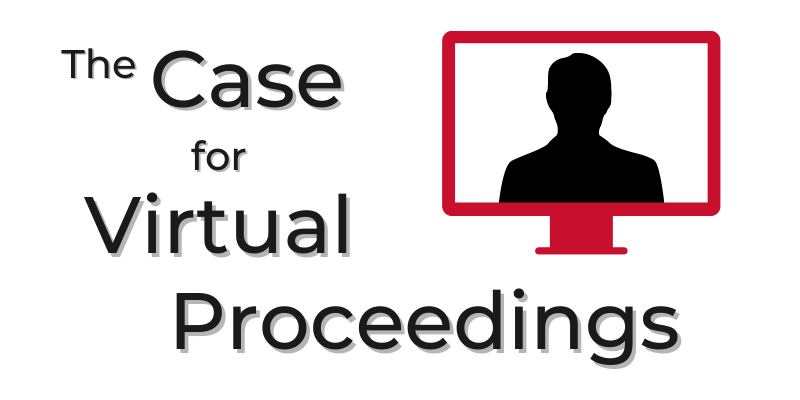Background
Prior to 2020, only about 5% of our reporting firm’s depositions were virtual (or remote). The technology to conduct remote proceedings without specialized equipment was young, and the practice of law is steeped in tradition, adopting changes only at a glacial pace. Love them or hate them, virtual proceedings came to the rescue of the otherwise halted legal system during the COVID-19 pandemic. As the safety concerns stretched into a second year, most all litigators conducted them, and virtual became mainstream.
Even with experience hosting virtual depositions, early efforts were clunky to be sure. Our firm rapidly organized around best practices, setting expectations and ironing out wrinkles in the experience. We heard everything from complaints to grateful accolades that we could help move cases forward. All feedback was helpful.
The regulatory landscape across the entire nation is complex, varying by jurisdiction and by time as temporary orders expire, get renewed, updated, made permanent, or even cancelled. Each attorney will reach their own legal opinions so this article will focus on the merits and challenges of virtual proceedings with important points to consider.
Pros
The benefits of virtual proceeds are almost obvious. Time and costs are saved by eliminating travel and per diem to a physical venue. This is in the best interests of the responsible party, and it makes depositions more accessible. Attorneys bill for meaningful legal services rather than logistical waste. The lower cost represents a lower bar for conducting a deposition, and that helps the system work.
Objections
Two technology concerns are frequently raised. Broadly, attorneys worry about variables outside their control. Nobody likes surprises, especially when the stakes are high. Of course, attorneys use computers every day for important work. The pandemic and the associated need to rely on virtual events ripped the proverbial bandage off. The combination of user experience and rapid refinements to virtual meeting softwares have moderated this concern.
Frustration showing exhibits also has a technology aspect, but it is more acute. Even if an attorney has complete confidence in their ability to share exhibits without confusion, that administrative burden can be counter-productive to their performance. Deposing a witness is strategic work that can involve pivots and calling audibles. This objection is wise. Readback’s implementation of Active Reporting provides a Guardian to display exhibits when requested by the attorney, among other important duties.
The second common concern is the potential to give up a strategic presence with the witness. That is a common belief, but there is another point of view. In a March 2021 Bar News article Adapting to Remote Justice, by Shane Carew, attorney Rick Friedman asserts that he has better success with remote:
“The goal of a deposition is to obtain information, to pin witnesses down to specifics in their testimony. A lawyer asking questions through a window in a computer screen is less intimidating, and that’s precisely the point: Friedman firmly believes that when witnesses feel more comfortable, they are actually more likely to be more forthcoming.”
Indeed, being under oath may be intimidating enough for most deponents.
New Normal
Time will tell how this settles down, but comments from customers who appreciate the better efficiency have included, “We’re never going back.”
Use Cases
Courts themselves have used remote proceedings for pre-trial conferences and many other purposes. For our purposes, the scope of this article is civil litigation for which court reporters have typically been used to capture an impartial record. That would include depositions and Examinations Under Oath (EUO).
For Active Reporting, the reporting team will always be remote as that is what makes a team possible. The use cases, then, become varying scenarios of varying locations of the other participants:
| Use Case | Description |
| Virtual | Completely virtual proceedings in which all parties are in separate locations |
| Partially Virtual | Proceedings in which one or more parties are remote from others |
| In-person | Proceedings in which all parties are in a single location (except the reporting team) |
When you layer Active Reporting onto these benefits, you get an experience that in-person reporters simply can’t match. And while in-person testimony can be taken with remote reporters, the separate audio sources involved when the taking attorney is connected from a separate location is actually helpful for speaker identification, and that translates to fast, accurate transcripts.
Green
No discussion of virtual meetings would be complete without acknowledging the reduction in carbon footprint stemming from a digital presence, rather by transportation.


